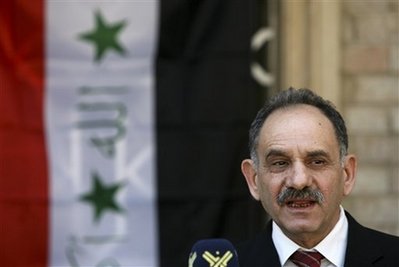Sunni leader to take part in Iraq election
BAGHDAD: A top Sunni lawmaker, who less than a week ago said he was pulling his party out of the election after he was banned from the race, reversed course on Thursday, saying that his party is back in the race.
Saleh al-Mutlaq told reporters he would now allow his party to take part in the vote and called on all Iraqis to participate in the election.
"After meetings and discussions, we decided not to give the liars a chance," he said, speaking next to his political ally Ayad Allawi, a former prime minister. "We decided to strongly participate in elections."
Al-Mutlaq was banned from running in the vote by a committee vetting candidates for ties to Saddam Hussein's Baath party. He said he quit the party in the 70s, and last Saturday said he was pulling his entire list out of the election, in protest.
When asked the reason for his turnaround, he gave no specifics, only saying: "We decided to participate for the sake of change."
Al-Mutlaq's National Dialogue Front has 11 seats in the outgoing legislature, the second-largest Sunni bloc in parliament. He fared well in last year's provincial elections, and is the main Sunni faction in an alliance with Allawi, a secular Shiite. The secular alliance is expected to pose a tough challenge to Prime Minister Nouri al-Maliki's coalition.
The decision by the Shiite-dominated committee to blacklist more than 400, mostly Sunni candidates along with al-Mutlaq, raised fears that Sunnis might boycott the election or view the results as tainted. The vetting process did include a few Shiites.
Allawi, a fierce critic of al-Maliki's government, said during the news conference that the coalition with al-Mutlaq and others, called Iraqiya, is fighting against sectarianism.
Allawi has often accused the current government, along with Iraq's religious parties, of trying to stoke the sectarian tensions in the country, and has tried to portray himself as the man who can lead the country out of its sectarian conflicts.
It was unclear how al-Mutlaq's reversal would affect the vote or in fact how much weight his initial decision to pull his party from the election even had. The ballots had already been printed out and mailed to polling stations, and al-Mutlaq never clarified what would happen to votes cast for his candidates.
The possibility of a boycott or Sunni dissatisfaction with the election results has been closely watched by U.S. and international officials, worried that any Sunni dissatisfaction with the election would discredit the elections.
The U.S. has tied its troop drawdown to a fair and smooth election process, and a significant outbreak of violence could slow or stop the withdrawal of combat forces slated for the end of the summer.






